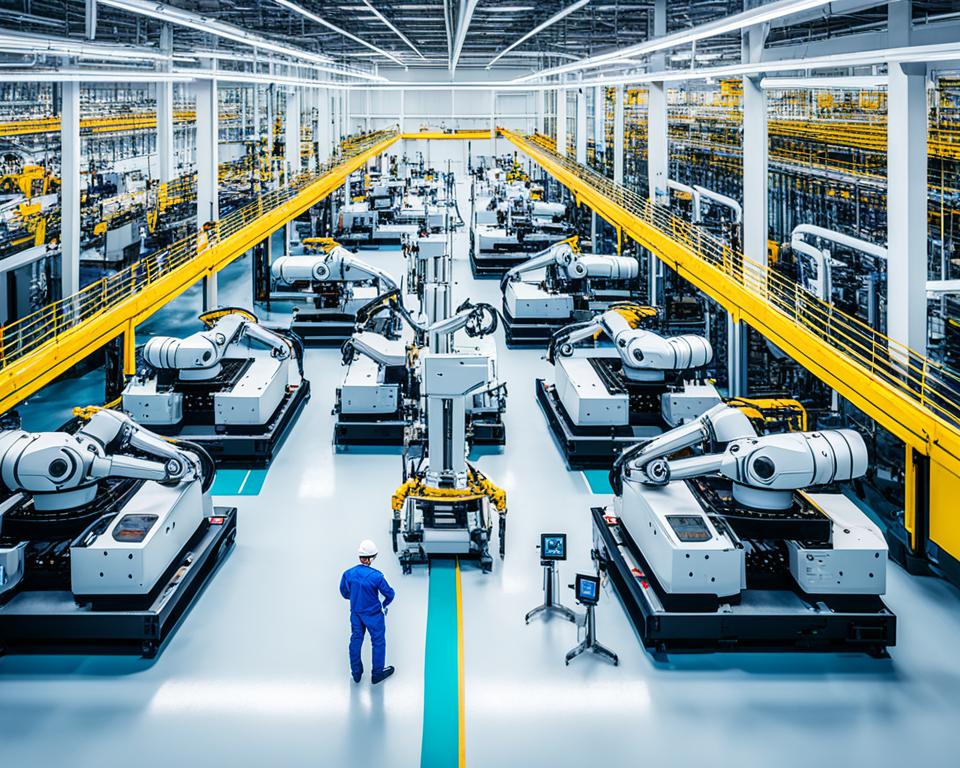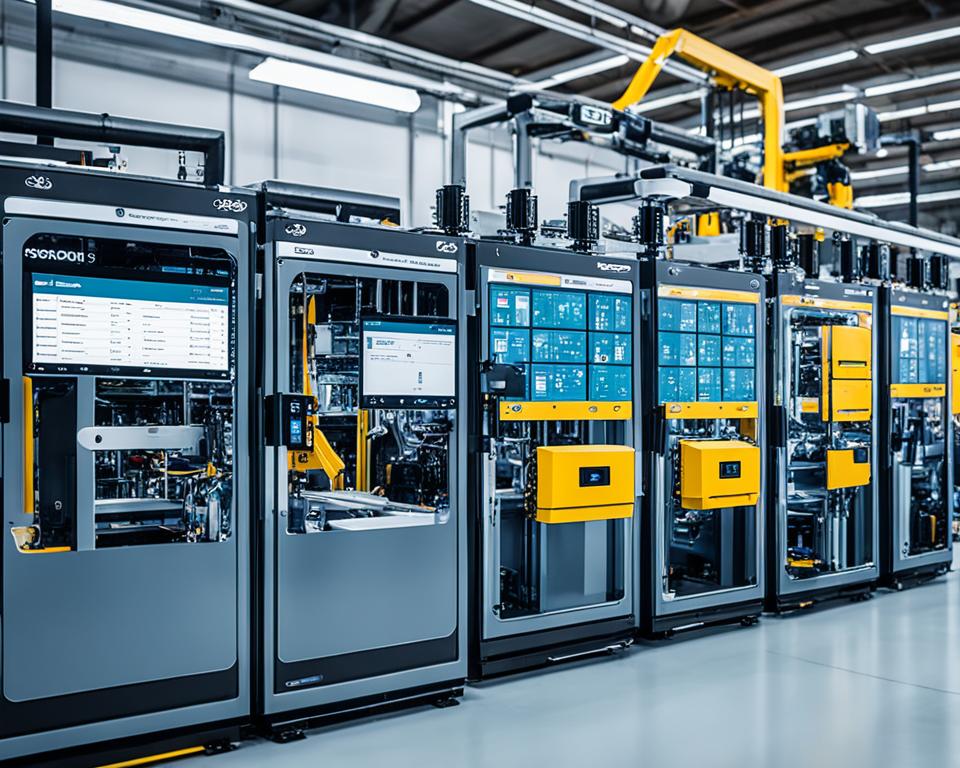Adverts
A Industry 4.0 and the Internet of Things (IoT) are transforming the way manufacturing is realized. These technologies are driving the automation and the scanning of industrial processes, bringing efficiency, productivity and innovation for industries.
Adverts
A Industry 4.0 is a concept that encompasses different technologies, as artificial intelligence, robotics, IoT It is cloud computing, with the aim of creating smart and connected factories. A IoT, in turn, allows the connection of devices via the internet, facilitating the exchange of information between machines, equipment and systems.
That revolution at manufacturing is providing a series of benefits for industries. A automation of industrial processes increases efficiency and reduces production costs. A scanning of data allows for real-time monitoring and more assertive decision-making. Furthermore, the integration of technologies from the Industry 4.0 creates new business opportunities and production models.
Industry 4.0 and IoT are paving the way for a manufacturing more agile, intelligent and connected. It is time for companies to adapt to these technologies and take advantage of the revolution in the industry to drive its growth and competitiveness.
Adverts
Main points of this article:
- Industry 4.0 and IoT are transforming manufacturing.
- These technologies promote automation and the scanning of industrial processes.
- Industry 4.0 brings benefits such as efficiency, productivity and innovation.
- IoT allows devices to be connected and information exchanged between them.
- Companies need to adapt and take advantage of revolution in the industry.
Industry 4.0 Technologies
In the era of Industry 4.0, a series of technologies are driving the transformation of industries and improving their efficiency and productivity. These revolutionary technologies are shaping the future of manufacturing and providing unprecedented opportunities for companies. Below, we present the main Industry 4.0 technologies:
Artificial intelligence
A artificial intelligence uses data analysis and machine learning to interpret events and automate decisions in industries. With the ability to process large volumes of data in real time, artificial intelligence allows autonomous monitoring and control of processes, identification of patterns and optimization of operations.
Cloud computing
A cloud computing provides flexible and accessible computing resources over the internet. Through the cloud, companies can store and process large amounts of data, share information and use software and services remotely, ensuring scalability and cost reduction.
big data
O big data is a technology that uses statistical and machine learning techniques to extract relevant information from large data sets. As big data, companies can analyze complex, unstructured data in real time, identifying patterns, trends and valuable insights for decision-making.
Internet of Things (IoT)
A internet of things enables the interconnection of objects via the internet, allowing the collection, analysis and sharing of data between different devices. With IoT, industries can achieve efficiency gains, monitor and control equipment remotely, perform predictive maintenance and personalize products and services.
Advanced Robotics
A advanced robotics involves the use of autonomous robots capable of physically interacting with people and the environment. These robots can perform complex tasks, increase workplace safety, improve process accuracy and quality, and increase productivity.
Digital Manufacturing
A digital manufacturing uses simulation and collaborative tools to create production process definitions. With the digital manufacturing, companies can optimize the planning of their operations, test and validate projects virtually, reducing errors and costs before physical production.
Additive Manufacturing
A additive manufacturing, also known as 3D printing, allows the manufacture of parts by superimposing layers of material. This technology provides production flexibility, reduced manufacturing time, product customization and waste reduction.
Systems integration
A systems integration consists of bringing together different computing systems to exchange information in real time. With the systems integration, companies can integrate processes and optimize communication between equipment, making production more efficient and reducing errors.
Simulation Systems
You simulation systems generate digital models to simulate real-world processes. With these models, companies can anticipate problems, test different scenarios, optimize performance and reduce product and process development time.
Digitization
Digitization refers to the adoption of digital technologies in all aspects of industrial operations. This includes the digitalization of processes, documents, communications and products, ensuring greater efficiency, precision, traceability and flexibility in operations.
These Industry 4.0 technologies are revolutionizing the industry and providing opportunities for improvement, growth and innovation. By adopting these technologies, companies can increase their productivity, reduce costs, create new business models and remain competitive in the increasingly globalized market.
Benefits of Industry 4.0
The implementation of Industry 4.0 brings with it a series of benefits for the industries that adopt it. Through the use of digital technologies such as automation and advanced connectivity, these companies have experienced an average increase of 22% in production capacity, especially micro and small companies.
Productivity gains are achieved through the application of technologies such as artificial intelligence, Internet of Things (IoT) and cloud computing. These solutions allow you to optimize processes, speed up communication and improve operational efficiency.
A practical example of the benefit of Industry 4.0 for companies microenterprises they are the pilot programs carried out by SENAI. Through the use of tools such as sensors, cloud computing and IoT, these programs have demonstrated significant productivity gains. This shows that even smaller companies can benefit from digital technologies and increase its production capacity.
A transformation digital technology provided by Industry 4.0 has the potential to boost the growth of industries, especially microenterprises, ensuring your competitiveness in an increasingly globalized market.
| Digital Technologies | Benefits |
|---|---|
| Automation | Increased operational efficiency |
| Advanced connectivity | Improved communication and information exchange |
| Artificial intelligence | Process optimization and more accurate decision making |
| Internet of Things (IoT) | Device integration and control, agility in processes |
| Cloud computing | Access to flexible and scalable computing resources |
Challenges of Industry 4.0 in Brazil
The development of Industry 4.0 in Brazil faces several challenges. The advancement of this technological revolution requires investments significant amounts of cutting-edge equipment and technologies. Furthermore, companies need to adapt and transform their layouts and production processes to integrate new technologies.
Another challenge is the development of new specialties It is Skills to deal with Industry 4.0. The changes brought about by this transformation industry demand qualified professionals in areas such as artificial intelligence, robotics, data analysis and IoT.
The adoption of Industry 4.0 also requires the establishment of industrial policies that encourage and promote the adoption of these technologies. It is necessary to create a favorable environment for investment in innovation and for the formation of partnerships between companies and research institutions.
"A adaptation Industry 4.0 involves a restructuring of companies, new management models and a change in organizational culture. It is a challenge that requires commitment and long-term vision from Brazilian companies.”
Overcome these challenges It is essential for Brazil to remain competitive and keep up with the revolution in industry. By facing these difficulties, Brazilian companies will be able to benefit from Industry 4.0 technologies, increasing their productivity, efficiency and competitiveness in the global market.
Statistics on the challenges of Industry 4.0 in Brazil
| Challenge | Statistic |
|---|---|
| Investments in equipment and technologies | It is estimated that it will be necessary investments of R$ 100 billion in the coming years for the implementation of Industry 4.0 in Brazil. |
| Adaptation of layouts and production processes | Only 17% of Brazilian companies are prepared for Industry 4.0, according to a SENAI survey. |
| Development of new specialties It is Skills | Brazil faces a shortage of qualified professionals in areas such as artificial intelligence, IoT and data analysis. |
| Industrial policies | The establishment of industrial policies that encourage innovation and the adoption of Industry 4.0 is still a challenge in Brazil. |
| Competitiveness | Only 1% of Brazilian industries are considered digital leaders, according to the World Economic Forum. |
Source: Research and specialized studies on Industry 4.0 in Brazil.
By overcoming these challenges, Brazil will be prepared to take advantage of the benefits of Industry 4.0 and strengthen its position on the global stage, boosting the country's economic growth and competitiveness.

Impacts of Industry 4.0 in Brazil
Research and estimates indicate that the implementation of Industry 4.0 will have impacts significant in economy Brazilian. The adoption of technologies related to IoT (Internet of Things) has the potential to impact the GDP Brazilian economy by up to US$ 39 billion by 2030, boosting the country's economic growth.
One of the main advantages of Industry 4.0 is the cost reduction. Through the implementation of advanced technological solutions, such as analytics, automation and IoT, companies can achieve gains in operational efficiency, resulting in lower energy consumption, cost reduction maintenance and increased work efficiency.
Industry 4.0 also has the potential to boost the competitiveness of Brazilian companies. With the adoption of cutting-edge technologies, companies can improve their production capacity and their insertion in global value chains. This allows them to become more competitive in the international market, increasing their global share.
| Impacts of Industry 4.0 in Brazil | Benefits |
|---|---|
| Impact on GDP Brazilian | Increase of up to US$ 39 billion by 2030 |
| Cost reduction | Economy energy and reduced maintenance costs |
| Competitiveness | Insertion into global value chains |
Industry 4.0 is transforming the Brazilian economic scenario, boosting productivity, innovation capacity and competition in the global market. To take advantage of all the benefits of this technological revolution, Brazilian companies must invest in training, infrastructure and strategic partnerships for the successful implementation of Industry 4.0.

Job market in Industry 4.0
Industry 4.0 is impacting the job market, requiring new qualifications from professionals. The demand for skills such as schedule, robotics and data analysis has increased. Furthermore, the socio-emotional skills, such as creativity and entrepreneurship, are also valued in this new context. It is essential that professionals adapt to this new reality and acquire the necessary skills to stand out in the field. job market of Industry 4.0.
Skills required in Industry 4.0:
- Schedule: Mastery of languages schedule It is essential to utilize Industry 4.0 technologies, such as automation and IoT.
- Robotics: Knowledge in robotics allows the interaction and control of autonomous devices present in the industry.
- Data analysis: The ability to extract valuable insights from large data sets is crucial for making informed decisions.
- Socio-emotional skills: Skills such as collaboration, problem solving, creativity and entrepreneurship are increasingly valued, as they allow us to deal with complex situations and promote innovation.
The demand for qualified professionals in these fields is constantly growing. Companies from different sectors are looking for specialists in schedule, robotics and data analysis to drive digital transformation and automation of your processes. Furthermore, the ability to quickly adapt to new technologies and work collaboratively are also valued characteristics in the job market of Industry 4.0.
To stand out in this market, it is important to invest in training and professional development. Search for courses and training in the areas of programming, robotics and data analysis, in addition to developing your socio-emotional skills through workshops, readings and practices. Always be up to date with the latest Industry 4.0 trends and look for opportunities to apply your knowledge in projects and practical experiences.
“Industry 4.0 offers a promising scenario for professionals who have the right skills. Those who invest in their qualification and are willing to adapt to technological advances will find opportunities for growth and development in the new era of manufacturing.”
| Skills | Description |
|---|---|
| Schedule | Mastery of programming languages to use Industry 4.0 technologies. |
| Robotics | Knowledge in robotics for interaction and control of autonomous devices. |
| Data analysis | Ability to extract insights from large data sets. |
| Socio-emotional skills | Skills such as collaboration, problem solving, creativity and entrepreneurship. |
New concepts in Industry 4.0
Industry 4.0 brings with it a new range of concepts and requires a infrastructure differentiated for its full functioning. Among the key aspects, the following stand out: data centers, which play a fundamental role in controlling all industrial activities, storing the data necessary for the operation of intelligent systems. They provide the processing and storage capacity needed to support the growing demands of Industry 4.0.
A information security and backup solutions are also essential components in this new reality. With the ever-increasing amount of data and critical information circulating across networks, it is crucial to ensure that this information is protected against cyber threats. Efficient security mechanisms and adequate backup systems must be implemented to safeguard company data and operations.
The Internet of Things (IoT) and edge computing also play a vital role in Industry 4.0. IoT allows connection and communication between devices and machines in real time, thus creating an interconnected digital ecosystem. Already the edge computing allows data processing to occur closer to devices and sensors, reducing latency and enabling real-time decision making. These technologies enable efficient monitoring and control of industrial operations, as well as real-time analysis of collected data.
Industry 4.0 is redefining the way industries operate, exploring concepts as data centers advanced, information security and IoT. These new paradigms are driving a revolution in the industry, making operations smarter, more efficient and connected.
To support this new industrial era, infrastructure it must be robust and adapted to the specific needs of Industry 4.0. The appropriate combination of data centers, information security, IoT and edge computing is essential to ensuring the success of modern industrial operations.
Check out an overview of the conceptsKey features of Industry 4.0:
| Concept | Description |
|---|---|
| Data centers | Fundamental role in controlling all industrial activity, storing the data necessary for the operation of intelligent systems. |
| Information security | Adequacy of security measures to protect industry information against cyber threats. |
| IoT | Connection and communication between devices and machines, allowing the creation of an interconnected digital ecosystem. |
| Edge Computing | Data processing close to devices and sensors, allowing real-time decision making. |
As Industry 4.0 continues to evolve, infrastructure needs to keep up with the growing demands of the new industrial era. The adoption of these new concepts is essential to ensure the efficiency, safety and success of modern industrial operations.
Sources:
– Source 1
– Source 2
Conclusion
Industry 4.0 and IoT are revolutionizing manufacturing, transforming the way industries operate and bringing significant benefits. The adoption of these technologies provides an increase in productivity and a reduction in costs, while also enabling the creation of new business models. Furthermore, they drive the digitalization and automation of industrial activities, promoting greater operational efficiency and improving the competitiveness of companies.
To accompany this transformation, it is essential that Brazilian industries adapt to the challenges and take advantage of the opportunities offered by Industry 4.0 and IoT. These technologies represent a unique chance to boost economy of the country, improve people's quality of life and position Brazil as a protagonist in this industrial revolution.
The transformation brought about by Industry 4.0 and IoT is just beginning. With the continuous advancement of technologies and increasing digitalization, it is expected that new benefits and opportunities will be discovered in the future. Therefore, industries must be aware of trends and constantly seek innovation to remain competitive in this constantly evolving scenario.
In conclusion, Industry 4.0 and IoT are driving the transformation of manufacturing, bringing tangible benefits and opening doors to a more productive and technologically advanced future. It's time to embrace these technologies, adapt and seize the opportunities they offer. The revolution has already begun, and it is necessary to be prepared to be part of this new industrial paradigm.

 **Learn all about the Paris 2024 Olympics: Times, Dates and More!**
**Learn all about the Paris 2024 Olympics: Times, Dates and More!**